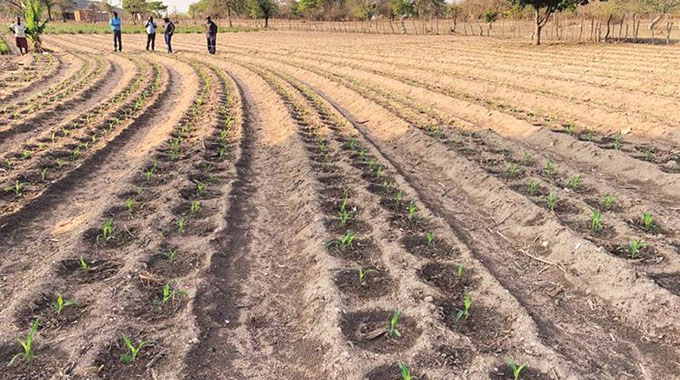The Climate-Proofed Presidential Inputs Scheme popularly known as Pfumvudza/Intwasa, will benefit 2,3 million vulnerable households in the communal, A1, small-scale commercial farming and old resettlement sectors to produce cereals, oilseeds and legumes in the forthcoming summer cropping season.
Pfumvudza is a concept aimed at climate proofing agriculture by adopting conservation farming techniques and involves the utilisation of small pieces of land and applying the correct agronomic practices for higher returns.
The concept, which will be applied to maize, traditional grains and soyabeans, will also commercialise smallholder agriculture.
Conservation agriculture is based on the principles of minimum soil disturbance (holing out), mulching to conserve moisture, timeliness of operations and adoption of good agronomic practices.
Outlining the state of preparedness for the 2021/2022 summer cropping season, Lands, Agriculture, Fisheries, Water and Rural Resettlement Minister Dr Anxious Masuka said about 1,5 million households are expected to put 280 000 hectares of maize under Pfumvudza to produce 1,4 million tonnes of the crop.
Minister Masuka said Government was targeting 540 000 households to put 103 680 hectares under sorghum to produce 487 296 tonnes.
For soyabeans, Government is targeting 560 000 households to plant 20 000 hectares and produce 30 000 tonnes while 500 000 households are expected to plant 32 000 hectares of groundnuts and produce 32 000 tonnes.
About 260 000 households are expected to put 49 920 hectares under pearl millet and produce 124 800 tonnes.
“The programme will support five Pfumvudza plots (39m x 16m=0.0624 ha)) per household with a standardised crop input package for maize, sorghum, pearl millet, soya beans, sunflower, groundnuts, vegetables and cow peas,” he said.
“In the low potential areas, the five plots will comprise: three of the plots will be put under maize. One maize plot for food security of the household and the other two for commercial intentions.
“One plot will be put under soyabean targeting 50 percent of the households and one plot will be put under sugar beans or groundnuts or cow peas.”
In low rainfall agro-ecological regions, three plots will be put under cereals (maize/sorghum/pearl millet).
One maize plot is for food security of the household and the other two plots under traditional grains for commercial intentions.
The other plot will be put under sunflower or castor bean, while another one will be put under cowpeas or groundnuts to support household food security, as well as supporting cereal or legume rotations.
Minister Masuka said the input packages include lime, basal fertiliser, top dressing, folia fertilisers and pesticides.
“Each farming household will get a free input package comprising 1x10kgs maize/ 5kg sorghum/ 2kg/pearl millet, 1x5kg soyabean/ 2kg sunflower/ castor bean (castor bean will be intercropped in the Pfumvudza crops for all crops) and 1 x 5kg sugar beans or 5kg cowpeas or roundnuts,” he said.
Some farmers will get 5kg of summer wheat, long season variety, 2x50kg of Compound D fertiliser, 1x50kg top dressing fertiliser, and chemicals for Fall Armyworm or stalk borer.
The seed will depend on the farming region.
Distribution of inputs will target households that have carried out Pfumvudza/Intwasa by potholing or ripping a minimum of three plots each.
In the 2021/22 summer programme, the target is to sustainably increase crop production and productivity to meet and surpass the national requirements for both human consumption and industrial use through the implementation of the key tenets of the Agriculture Recovery Plan, anchored on conservation agriculture principles to climate proof the Presidential Input Scheme, provision of inputs (fertilisers, seed, agrochemicals and other key inputs).
Government also wants to ensure constant supply of key utilities such as power and fuel to farmers and crowding-in the private and financial services sectors, among others.


